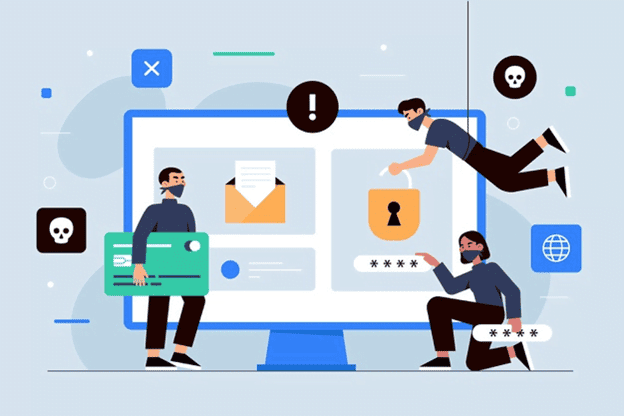If you have an email address, use social media, or shop online, there’s a big chance you’ve been a victim of a data breach.
Table of Contents
ToggleYou’ve probably also heard of many data breach horror stories and seen head-spinning sums companies spend on recovering from such incidents.
In 2020, the average cost of a data breach worldwide was $3.86 million, while in the US, it was $8.64 million, according to IBM’s Cost of a Data Breach Report. Moreover, the current pandemic, and more precisely, remote work, could increase the cost of each breach by an additional $137 thousand.
But big data breaches don’t only cause financial losses. They can also tarnish your reputation.

Brand Reputation
It’s hard to imagine anything today that could hurt brand reputation more than a data breach. With social media and online reviews, it’s easier than ever to share bad experiences with others.
An Interactions Marketing survey found that 85% of shoppers who had personal information stolen as a result of a security breach tell others about their experience, while 33% percent complain about their experience on social media.
In the past decade, we’ve witnessed many high profile breaches that gained a lot of attention from the public.
In October 2016, Uber suffered a data breach. However, instead of disclosing the details about their incident, they decided to pay hackers to delete the data and stay silent. However, the breach was eventually revealed in November 2017, resulting in financial penalties and broken customer trust, mostly because they failed to follow the rules regarding data breach notification.
Even though the breach was revealed in late 2017, the damage was severe enough to drop their consumer perception by 141.3% that year.
It can take a long time to bounce back and repair the damage the data breach caused to brand reputation. However, it can be done if you have a quick and effective response after it happens.
For example, Target experienced a data breach in 2013, and while their customer perception also suffered some damage, they managed to bounce back thanks to their transparent approach and quick implementation of improvements.

Bigger, more recognizable companies such as Target usually have an easier time recovering from a breach. Unfortunately, smaller businesses often don’t have enough resources, and their customer base is not strong enough to withstand such a blow to their reputation.
Data Breach Damages Consumer Trust
There’s no doubt that customer data protection is becoming more important than ever. Company emails and customer databases can contain vast amounts of sensitive data, from contact information to payment records. That’s why businesses nowadays have to abide by strict email compliance regulations in order to protect customer data, avoid legal issues, and prevent reputation damage.
If their private data gets leaked, it’s only natural to expect that customers will lose trust in your business. In fact, The Ponemon Institute’s Data Breach Impact study found that 65% of data breach victims lost trust in an organization as a result of the breach.
Once the trust is broken, it can be difficult to restore it, and your once loyal customers will turn to your competitors.

Customer Turnover
Once your brand reputation gets damaged by a data breach, so does your customer retention. If they lose trust in your business and start fearing that their personal information will be exposed, even your most loyal customers will second guess frequenting your business.
As a result, your customer turnover will go up. Also known as the churn rate, customer turnover is one of the most important metrics that indicate the health of your business. With high churn rates, your customer base will be unstable, making it difficult to have a solid plan for future growth, especially in a situation when your reputation is already damaged.
Companies that don’t have a reliable customer base have to spend more valuable time and resources on attracting new customers to compensate for the ones they lost. With the bad press and broken trust due to a data breach, this can be even more challenging.
Data Breach = Financial Losses
With high customer turnover rates also comes the decrease in total revenue.
Ponemon Institute’s study shows that organizations that lost less than 2% of customers after a breach experienced an average revenue loss of $2.67 million, while companies that lost more than 5% of their customers had an average revenue loss of $3.94 million.
Additionally, once a breach is disclosed, stock prices drop an average of 5%.
Add to this the cost of containing a data breach, and you risk taking financial losses that you may not be able to recover from.
What To Do
As companies are collecting more and more data, and the risks of a data breach increase, they must have a proper response plan in place in order to act quickly and lower the damage as much as possible in case the breach happens.
When it comes to protecting business reputation after a breach, communication is key. Make sure to be the first one to break the new to your customers if their private data gets compromised. Don’t try to stay silent and hope it will pass unnoticed. Instead, be transparent, empathetic, and show that you’re doing everything you can to improve data security and prevent future breaches.
Summary:
How Poor Data Protection Can Hurt Your Brand
If you have an email address, use social media, or shop online, there’s a big chance you’ve been a victim of a data breach. In 2020, the average cost of a data breach worldwide was $3.86 million, while in the US, it was $8.64 million, according to IBM’s Cost of a Data Breach Report. It’s hard to imagine anything today that could hurt brand reputation more than a data breach. There’s no doubt that customer data protection is becoming more important than ever. Company emails and customer databases can contain vast amounts of sensitive data, from contact information to payment records. If their private data gets leaked, it’s only natural to expect that customers will lose trust in your business. Once your brand reputation gets damaged by a data breach, so does your customer retention. With high customer turnover rates also comes the decrease in total revenue. As companies are collecting more and more data, and the risks of a data breach increase, they must have a proper response plan in place in order to act quickly and lower the damage as much as possible in case the breach happens.





